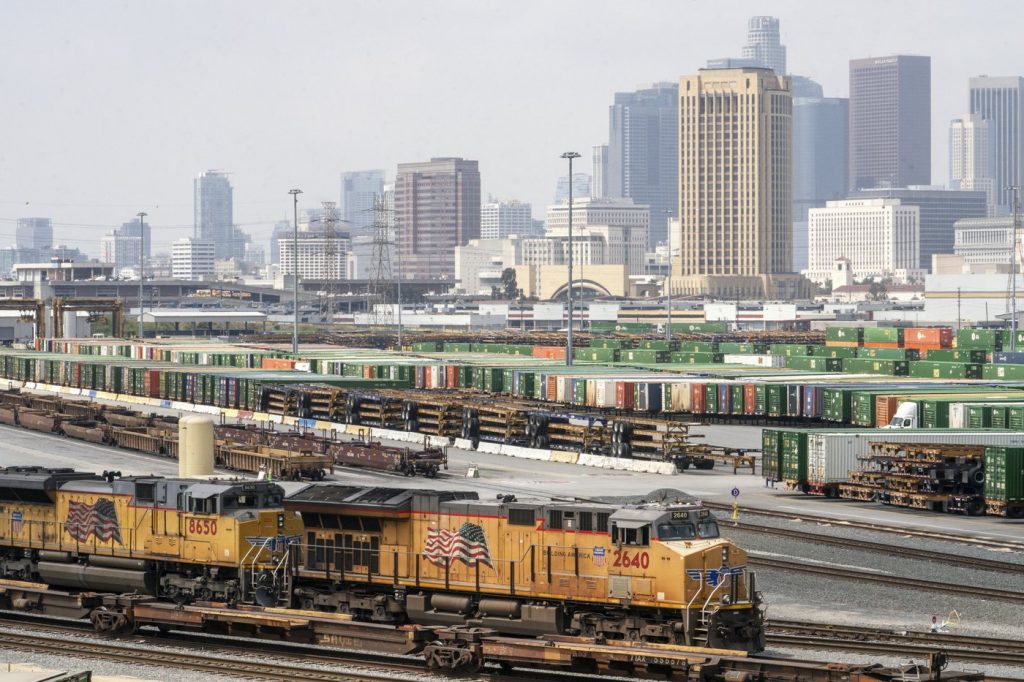OMAHA, Neb. (AP) – Union Pacific has announced a significant intention to acquire Norfolk Southern in a landmark $85 billion deal. This merger would result in the establishment of the first transcontinental railroad in the United States, potentially triggering an extensive wave of rail mergers across the nation.
The proposed merger, revealed on a Tuesday, would integrate Union Pacific’s extensive rail network, which predominantly operates in the West, with Norfolk Southern’s tracks that traverse 22 Eastern states and the District of Columbia. Historically, the U.S. was first connected by rail in 1869, when a golden spike was driven in Utah, signifying the unification of the East and West Coasts. However, no single entity has ever managed to control this vital coast-to-coast rail passage.
Proponents of the merger argue that it would enhance the efficiency of delivering raw materials and goods nationwide by reducing delays typically encountered when shipments are transferred between different railroads. The merger discussions were first reported by the Associated Press earlier this month, a week before the official confirmation.
The deal is expected to undergo intense scrutiny from antitrust regulators, who have implemented stringent standards for railroad mergers following past consolidations that led to significant transportation disruptions. If this merger gains approval, it could exert considerable pressure on the remaining major American railroads—BNSF and CSX—to consider merging as well, in order to create a competing transcontinental railroad. Additionally, Canadian National and CPKC, the continent's other two major railroads, may also become involved as their networks feed into the U.S. and extend south into Mexico.
Some major shippers, like chemical plants situated in the Gulf, express concerns regarding the potential establishment of a monopoly that could significantly influence shipping rates. Conversely, large companies such as Amazon and UPS may support the merger, anticipating quicker and more reliable package deliveries. Stakeholders, including unions and various communities along the rail lines, will have opportunities to voice their opinions before the U.S. Surface Transportation Board (STB).
If the merger is successful, consumers could benefit from reduced shipping rates and shorter delivery times. Union Pacific claims that their combined operations would result in improved delivery efficiency.
Speculation surrounds whether this deal might secure approval under the pro-business Trump administration's policies, particularly as the STB is currently composed of an equal number of Republicans and Democrats, led by a Republican chair. Trump is expected to appoint a fifth member before the deal is formally considered.
Union Pacific is offering a combination of $20 billion in cash and stock shares to facilitate the acquisition. Specifically, Norfolk Southern shareholders would receive one share of UP stock and cash amounting to $88.82 for each of their shares, valuing Norfolk Southern at approximately $320 per share. Up until the recent speculations regarding the deal, Norfolk Southern’s shares were trading just above $260.
In premarket trading, Union Pacific’s stock price dropped nearly 2% to $224.98, while Norfolk Southern’s stock fell more than 3% to $277.40. Union Pacific CEO Jim Vena, a strong advocate for the merger, shared insights on how the integration would allow products such as lumber from the Pacific Northwest, plastics from the Gulf Coast, and steel from Pittsburgh to reach their destinations more smoothly and effectively.
Vena elaborated on the merger’s significance, stating, “It builds upon President Abraham Lincoln’s vision of a transcontinental railroad from nearly 165 years ago and will usher in a new era of American innovation.” The U.S. railroad industry has already seen vast consolidation; of the more than 30 major freight railroads that existed in the early 1980s, only six major players now dominate the market.
Meanwhile, BNSF, owned by Berkshire Hathaway, has sufficient financial resources to pursue an acquisition of CSX if it chooses to do so. Warren Buffett, with over $348 billion in cash reserves, may consider engaging in substantial acquisitions before his planned retirement at the year's end. Although Buffett has recently dismissed reports of hiring Goldman Sachs for railroad advisory services, his past indicates a preference for direct negotiations over employing investment bankers.
Despite the potential benefits claimed by Union Pacific and Norfolk Southern, the approval process for such a merger remains uncertain, given the STB’s track record of imposing rigorous standards for consolidation within the crucial rail industry. A similar merger involving Union Pacific in 1996 resulted in significant traffic disruptions, prompting the STB to be highly vigilant regarding future consolidations.
Norfolk Southern’s CEO, Mark George, assured stakeholders of their commitment to ensuring smooth integration post-merger, emphasizing the planning phase set to last two years before any approval can be anticipated. Recently, Norfolk Southern reported a profit of $768 million for the second quarter, equating to $3.41 per share, a slight increase from the previous year but impacted by various one-time factors.











